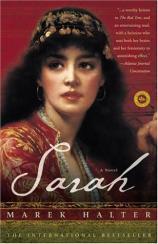Sarah: Book One of the Canaan Trilogy
Review
Sarah: Book One of the Canaan Trilogy
Biblical fiction doesn't get much better than this engrossing tale of Sarah, the wife of Abraham and the mother of the Israelite nation. For people of many faiths, Sarah is a tantalizing figure, and Marek Halter brings her vividly to life in this colorful portrait.
As with Anita Diamant's THE RED TENT, Halter uses the image of menstruation or "bridal blood" as the axis around which the story revolves. After a brief prologue, the story opens as Sarai (her name before God changed it to Sarah) wakes to find she has begun menstruating. Although prepared for it by her relatives, Sarai despairs because in her home culture of Ur, a girl becomes a bride after her first period.
On her wedding night, sensing that her prospective bridegroom is wildly attractive yet desperately cruel, she flees the festivities to the outskirts of town. Muddy and disheveled, she meets the young Abram (later renamed Abraham), with whom she finds an instant chemistry. Discovered, Sarai returns in disgrace to her father's house for several months. Fearing becoming betrothed again, she resorts to the herbs of a local witch, dosing herself and becoming infertile. Since she no longer menstruates, she is chosen to become a high priestess. Blood continues to be a motif through the endless sacrifices made to the gods of Ur.
Several years later Abram returns and Sarai escapes again, this time to marry him. Abram, interestingly portrayed as a partner with his family in making household gods, hears a voice from "The One God" that calls him to begin a journey of whose end he is unsure. With him is his nephew, the orphaned Lot, who develops a rather incestuous, unhealthy fascination with his foster-mother Sarai (a good illustration of Halter liberally adapting the biblical story to provide more intrigue).
In a time when women were valued for the number of sons they could produce, Sarai mourns her infertility, but Abram assures her of his love. Strangely, as Sarai ages, her beauty remains unmarred by the passage of time. This is a rather spooky and fantastic addition to the story by Halter: "The weight of this silent miracle, though at first it delighted her, was beginning to terrify Sarai herself." Her beauty leads to a plot development straight out of the biblical text, when the couple and their entourage pass through Egypt, and Abraham, fearing for his life, passes Sarai off as his sister. In some steamy passages, Pharoah takes her to bed. She is returned to Abraham after Pharoah dreams that God wreaks havoc on him (another liberty with the scriptural text) and relationships between Abram and Sarai are strained for some time afterwards.
Abram's eventual desire for a child culminates in several tense plot developments that readers familiar with the Old Testament account will recognize. Blood continues to be a motif throughout the book, culminating in the tense scene where Abraham takes their only son Isaac to sacrifice him to God. Sarai, now Sarah, observing the scene, pleads with God for her son's life --- and Abraham stays his hand.
Halter writes good descriptions of the time, including food, geographic settings, and the various clothing worn by the characters. Unlike many more conservative biblical novels (think the wonderfully nuanced portrayals by Francine Rivers's "Lineage of Grace" series), Halter is frank in his depictions of the sexual attraction between the two, and in his portrayals of sex between various characters throughout the book.
This is the first book in The Canaan Trilogy, exploring the lives of biblical women through fiction (the second, ZIPPORAH, looks at the little-known life of the wife of Moses). Book groups will welcome the reading group guide, included at the end.
Review by Judy Gigstad
Marek Halter's SARAH is already a bestseller in France and has been translated into ten languages. The debut of SARAH in the United States will lend credence to Halter's sensitive treatment of women in the Bible. His plans for the two subsequent books in the trilogy are the stories of Zipporah and Lilah, lesser known than Sarah, wife of Abraham, but with tremendous impact on the shaping of society.
SARAH is the story of civilization's first rebellious teenager who became one of the world's most powerful women. An interview with the author reveals that he sees his women as those "beside," not "behind" great men. The book emphasizes Sarah's working side by side with Abraham to create a life filled with his religious beliefs. Sarah was not a believer in Abraham's God until late, after her early mistakes came back to haunt her unfulfilled life.
SARAH begins in the region now known as Iraq, the cradle of history, between the Tigris and the Euphrates rivers. The region was then known as Sumeria and the city-state where Sarai lived was known as Ur. She is the daughter of a powerful lord of Ur, a beautiful child who comes to womanhood in the first chapter. Her father arranges a marriage with a suitable man when she is twelve years old. The young girl is terrified of the prospects of the marriage bed and flees. Overnight, she runs from safety in the walled city to unknown terrors beyond it. On a riverbank she meets Abram, a poor but exotic member of a nomadic tribe. She spends the night with him and longs for his kiss. But soldiers discover her in the morning and return her to her father's house.
Halter has a unique way of entering his heroine's mindset and allowing the reader to see and feel the turmoil swimming in her head. Sarai's beauty is the quality that sets her apart from other women and allows her to once again return to family's favor. But her fate rests solely with her father. He again arranges a marriage, not as opulent with preparation as the first. Sarai is terrified. She cannot erase the memory of her night with the young nomad, Abram. Terrified, she sneaks away, buys a powerful potion from a witch and drinks it. She has made herself barren, unfit to wed. She becomes the powerful priestess of the god, Ishtar, idolized by residents of the entire city. During this period she meets Abram for the second time and follows her heart to remain with him.
The Bible has inspired Halter with stories of its feminine heroines. He feels that women were at times the true founders of world history. He takes liberty with Sarai's life, introducing stories about her that cannot be documented. But the sensual, exotic role she plays in Abram's story is one of both support and leadership. Aloof at times, her beauty both enhances and betrays her power in her newfound home. She has qualities that all humankind possesses: tenderness, love, jealousy, self-loathing, self-servitude, kindness and leadership. Sarai becomes Sarah, in final recognition of her husband's one God.
SARAH is the story of a modern woman, one who learns and profits from her mistakes. From her experiences, she is able to lend strength to the others in her care. This is a story of desire, intense emotion and consequences of sins committed to justify those feelings. I look forward to reading the second and third books in the Canaan Trilogy. Halter's message is one of hope for future generations through reflections upon a rich past.
Reviewed by Judy Gigstad on January 23, 2011
Sarah: Book One of the Canaan Trilogy
- Publication Date: April 26, 2005
- Genres: Fiction
- Paperback: 336 pages
- Publisher: Broadway
- ISBN-10: 1400052785
- ISBN-13: 9781400052783










